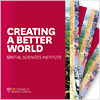B.S., Chemical Biology, Minor in Philosophy, Stevens Institute of Technology
M.P.H., Georgia State University
As a Population, Health and Place student at USC, Michelle is combining her broad interests in public health, biostatistics, spatial science and demography. She is developing ways to include more advanced statistical methods to her wheelhouse, adding to her background in regression methods and multilevel modeling.
Her research interests include health and socioeconomic disparities; health equity; vulnerable populations in research; unique sampling methods; urban demography and health in an urban environment, particularly maternal and child health and the health of the homeless; and how statistical and spatial analysis methods can be applied to all of the aforementioned topics.
 Michelle has been part of an interdisciplinary USC team that is contributing data analytics to evaluate the state of food insecurity in Los Angeles County. The results are helping civic leaders chart a path to improve food justice, especially as it has been impacted by the COVID-19 pandemic. By integrating innovative data sources, the team has identified dynamics in population food behaviors, food access, food security, and “last mile” food distributions in the county to better understand the state of resiliency and failures of the local food system.
Michelle has been part of an interdisciplinary USC team that is contributing data analytics to evaluate the state of food insecurity in Los Angeles County. The results are helping civic leaders chart a path to improve food justice, especially as it has been impacted by the COVID-19 pandemic. By integrating innovative data sources, the team has identified dynamics in population food behaviors, food access, food security, and “last mile” food distributions in the county to better understand the state of resiliency and failures of the local food system.
 From May 2021 to April 2022, Michelle is serving as the student editor of the American Journal of Public Health of the American Public Health Association.
From May 2021 to April 2022, Michelle is serving as the student editor of the American Journal of Public Health of the American Public Health Association.
Prior to joining the Population, Health and Place Ph.D. program, she was working in the Office of Epidemiology & Disease Surveillance at the Southern Nevada Health District, where she is the surveillance biostatistician, working primarily with surveillance data, compiling the monthly and quarterly reportable disease statistics, and writing data-related protocols, such as a set of formal data suppression rules. She worked to create moving average control charts as a method of disease outbreak detection. Additionally, she provides statistical support to the Data & Systems Improvement working group of the Southern Nevada Homeless Continuum of Care.
Michelle graduated with a Master of Public Health degree (Biostatistics concentration) from Georgia State University in December 2017. While enrolled at Georgia State, she worked as a research assistant for Dr. Betty Lai, investigating post-traumatic stress symptom trajectories among children and adolescents after disasters and helping to evaluate a brief child sex trafficking screening tool intended for use in hospitals, clinics, doctors' offices, and child advocacy centers. She was also employed at the Georgia Department of Public Health as the epidemiologist and project coordinator for the Georgia Pregnancy Risk Assessment Monitoring System, where she developed an ongoing interest in survey creation, validation, and administration.
Michelle also was a part-time adjunct psychology professor at Nevada State College, where she taught two classes (introductory statistics and introductory research methods) for the second semester. Prior to teaching at Nevada State, she taught standardized test prep (SAT, ACT, PSAT, GRE, GMAT) with Kaplan Test Prep and has experience teaching high school and college chemistry.
She has a passion for teaching and is excited to work toward a full-time career in academia.
Selected Publications:
Livings, M. S., Hsiao, V., & Withers, M. (2022). Breaking the Cycle of Family Violence: A Critique of Family Violence Interventions. Trauma, Violence, & Abuse.
Livings, M., Smith-Greenaway, E., Margolis, R., & Verdery, A.M. (July 20, 2022). Losing a grandmother can have long-lasting mental health effects for kids and adolescents, a new study finds. The Conversation.
Livings, M., Smith-Greenaway, E., Margolis, R., & Verdery, A.M. (2022). Bereavement & mental health: The generational consequences of a grandparent's death. SSM - Mental Health, Vol. 2.
Miller, S., Bruine de Bruin, W., Livings, M.S., Wilson, J., Weber, K., Frazzini, A., Babboni, M., & de la Haye, K. (2021). Self-reported dietary changes among L.A. County adults during the COVID-19 Pandemic. Appetite, 105586.
Livings, M.S., & Wu, A.-M. (2020). Local measures of spatial association. The Geographic Information Science & Technology Body of Knowledge (3rd Quarter 2020 Edition), John P. Wilson (Ed.).
Selected Presentations:
Livings, M.S., Bruine de Bruin, W., Wilson, J., Lee, B.Y., Horn, A., Xu, M., Li, K., Zhang, A., Weber, K., Babboni, M., & de la Haye, K. (November 2022). A comparison of past-week and past-year measures of food insecurity. Oral presentation at the 2022 American Public Health Association Annual Meeting, Boston, MA.
Livings, M.S., Smith-Greenaway, E., Margolis, R., & Verdery, A. (September 2022). Adolescent mental health, academic performance, and school behavior after grandparental bereavement. Oral presentation at the 2022 Interdisciplinary Association for Population Health Science Conference, Minneapolis, MN.
Livings, M.S., Smith-Greenaway, E., Margolis, R., & Verdery, A. (April 2022). Grandparental death and adolescent depressive symptoms. Oral flash presentation at the 2022 Population Association of America Annual Meeting, Atlanta, GA.
Livings, M.S. (October 2020). Exploratory spatial data analysis of rape in Philadelphia, 2015. Presented at the 2020 Women in Statistics and Data Science Conference (virtual).
Livings, M.S. (October 2019). Sexual violence and mental health across the lifespan. Presented at the 2019 Women in Statistics and Data Science Conference, Bellevue, WA.
Livings, M.S. and Aydin, O. (February 2021). Disrupted society, decreased traffic collisions: Spatio-temporal change-point analysis of traffic collisions in Los Angeles during Covid-19. Poster presented at the 2021 Los Angeles Geospatial Summit (virtual).



